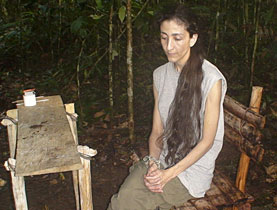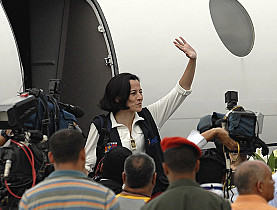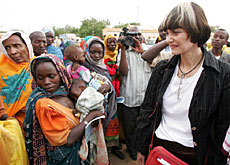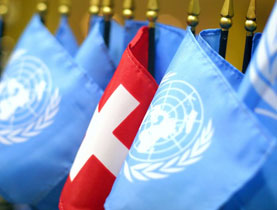Switzerland overhauls its “good offices”

The Swiss authorities are concentrating mediation efforts on a handful of countries to be able to deliver real added value, according to a foreign ministry official.
Thomas Greminger says it is worth it as peace promotion is beginning to bear fruit, with fewer conflicts being re-ignited despite the occasional high-profile failure.
The official is convinced Switzerland is ideally positioned to pursue an important role in helping broker peace deals. Since 2000 it has been involved in 20 mediation processes in 15 different countries, including Sudan, Colombia, Nepal and Kosovo.
“Switzerland is not threatening, it doesn’t have a hidden agenda and it’s a credible actor owing to its democratic, federal system. It also has a good reputation and the necessary expertise,” he said.
Also, it does not draw up terrorist blacklists, thus facilitating dialogue, explained Greminger, who heads Switzerland’s global peace-building efforts.
He was in Geneva on Wednesday to present Switzerland’s new SFr240-million ($240 million) peace promotion and human rights strategy, which was endorsed by parliament at the beginning of March.
Since the end of the Cold War, the number of conflicts worldwide has fallen by half. During the 1990s, 42 conflicts ceased thanks to mediation efforts, while 23 ended with a military victory.
Although 50 per cent of all peace accords have not been respected, this trend has changed since the beginning of 2000. Between 2000 and 2005, only two out of 17 agreements failed.
One of the possible reasons is an increased engagement by the United Nations, states and civil society in peace promotion activities, said the official.
Sharpen focus
In the new 2008-2012 peace promotion strategy, Switzerland has narrowed its focus from 13 to seven priority countries: Colombia, Kosovo, Burundi, Sri Lanka, Sudan, Nepal and Indonesia.
Eighty per cent of the budget will be dedicated to peace promotion work in these countries, with 20 per cent allotted to pilot projects, notably in the Central African Republic and Chad.
The new strategy is part of efforts to shake up Swiss diplomacy and its “good offices” policy and adapt them to the post-Cold War period, where new types of engagement and conflict-resolution instruments are required.
Norway’s mediation in the Israel-Palestinian conflict, initiated by academics, helped serve as a catalyst for the Swiss.
“We have a lot to learn from the Norwegians,” Greminger told swissinfo. “Norway showed us that it was possible even for a small country to have an impact.”
“It’s a very competitive market and if we want to make a mark we need to demonstrate excellence and have the necessary resources and instruments, not just the finance.”
As well as investing time and effort in its own mediators and facilitators, Switzerland has built close ties with a network of civil society organisations involved in peace promotion.
These include the Centre for Humanitarian Dialogue, Interpeace and the Graduate Institute of International and Development Studies, all based in Geneva. The authorities can also call upon a pool of some 600 experts.
Colombia failure
Greminger highlighted examples of the successful roles played by Swiss mediators: Sudan’s Nuba Mountains’ peace negotiations in 2002; discussions between Abkhazia and Georgia between 2002 and 2006; and the search since 2004 for a humanitarian accord with the Revolutionary Armed Forces of Colombia (Farc).
Despite this week’s failure of a high-profile French-Swiss-Spanish humanitarian mission to Colombia to secure the release of hostages held by the leftwing group, including former presidential candidate Ingrid Betancourt, Greminger said Switzerland remained upbeat.
“The process has known its ups and downs. We have to be patient and not be discouraged by this mission’s failure,” said the official, whose foreign ministry department supplied two members of the mission.
Switzerland, which has been involved in facilitating talks in Colombia since 2001, will continue its efforts despite the latest setback, he said. Betancourt – a French-Colombian dual national – is among an estimated 750 hostages who have been held captive by the Farc for years.
Greminger said efforts to reach Betancourt were partly undermined by the publicity surrounding the mission.
“All this noise is probably not very helpful when you want to reach a humanitarian accord,” he added.
swissinfo, Simon Bradley in Geneva
Switzerland has in effect been neutral since 1515 after Swiss forces were defeated by the French at the Battle of Marignano in Italy.
Switzerland’s neutrality was recognised by the signatory states of the Vienna Congress in 1815.
As a neutral state Switzerland cannot enter military alliances unless it is attacked. Its forces can only be used for self-defence and internal security. It cannot take sides in international conflicts and cannot give right of transit to foreign forces.
But neutrality does not prevent Switzerland from supporting humanitarian efforts in conflict situations worldwide.

In compliance with the JTI standards
More: SWI swissinfo.ch certified by the Journalism Trust Initiative




You can find an overview of ongoing debates with our journalists here. Please join us!
If you want to start a conversation about a topic raised in this article or want to report factual errors, email us at english@swissinfo.ch.